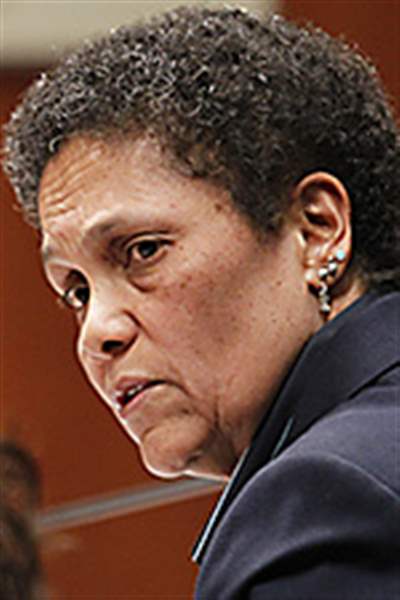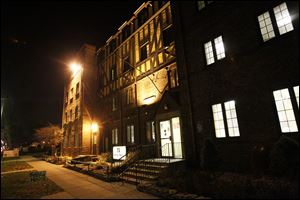
COMMENTARY
An irrational, unnecessary war on shelters
11/3/2013
Santiago.
THE BLADE
Buy This Image

Residents at Family House have almost no hot meals. The shelter has no operating kitchen because of funding cuts, so a few churches and good-hearted individuals serve a meal, which they prepare elsewhere, a few times a month.

The city of Toledo — the administration of Mayor Mike Bell — is waging a dumb and needless war on the city’s homeless shelters and transitional housing programs.

Santiago.
It is not because the mayor is lacking in compassion. Mayor Bell is one of the most personally compassionate people I have ever known.
It is not because the housing czar — Neighborhoods Director Lourdes Santiago — is dim. A lawyer and former prosecutor, she is extremely able.
It is because of a lack of deep and practical understanding of homelessness; a simplistic interpretation of a new federal policy; an equally simplistic conviction that shelters are out of date; and stubbornness — an inability to consider the possibility of being wrong. A cocktail of wrongheadedness.
And one more thing: The mayor’s management style, which is perhaps a good style generally, but disastrous in this case.
There are three issues: A new federal mandate on the homeless; HUD funding and HUD rules for funding; and how to admit and place homeless people in Toledo’s informal transitional housing system.
That “system” includes La Posada, Bethany House, Aurora House, Family House, and St. Paul's Community Center. Their federal and local funding has been drastically cut over the past three years, though the number of homeless people in Toledo is increasing, and all of these institutions are being asked to take in more, not fewer, clients.
The Cherry Street Mission, the largest shelter in town, accepts no public funding.
Some of these organizations are faith-based. Some are small. One deals with entire families. Two deal only with women and their children. One with domestic violence. One with substance abuse. One specializes in mental health. Each has an area of expertise or two. There is some overlap, but all are full most nights and none is expendable.
The new federal policy embraces “rapid rehousing”: Every homeless person should live in a home, not a shelter. And this is to be achieved immediately, not eventually — not after a person has solved all the problems that made him homeless. The hitch: Those problems are almost never strictly financial or temporary. Homelessness is often rooted in mental health and substance abuse issues.
Rapid rehousing is definitely the trend of the moment, with the power of the federal government fully behind it. And a home for every American is certainly a positive ideal.
But as an exclusive goal it is bad public policy — it is the triumph of theory over reality.
The reality is that not everyone is immediately ready to handle a home. And a few people will never be ready.
Ms. Santiago, who is a good person and a good administrator and cleaned up a mess in her department, has embraced this rapid rehousing concept like a 1920s communist hugging the doctrines of Vladimir Lenin. She thinks she has found the truth. She hasn't.
In a conversation a few weeks ago, Ms. Santiago made clear to me that she thinks eventually all shelters should and will disappear.
That isn’t going to happen, and we shouldn’t try to make it happen. In the end, that would mean women and children living on the street.
There will always be people not ready, or willing, to be permanently housed — rapidly or otherwise.
They found that out in New York City, where the city tried to phase out shelters; they are now rebuilding and reopening them.
Getting the homeless into permanent homes is a great concept — but it is just one of the proximate solutions we must pursue to homelessness.
Permanent housing options for the homeless should exist alongside shelters, for homeless policy is not an either/or proposition. We should not have to choose one option, one answer, or one truth.
Moreover, the new federal policy and the legislation that created it do not force a city to choose one. It embraces both options, though it makes permanent housing the desired eventual goal.
Indeed, it is still permissible to use one of the two major HUD funding streams (CDBG funds) for shelters.
Yet, Ms. Santiago insists that no HUD money should be used for shelters, as per what she says is HUD’s decree. And she has sold the mayor, and some members of City Council, on this interpretation of the law. I can find no other expert, activist, or administrator who thinks this is the correct interpretation.
To his credit, the mayor has lately taken to saying this: Perhaps more money for the shelters can be found from the city’s general fund.
Good for him.
But Ms. Santiago still thinks shelters are passe. And the mayor stands by her. So where does that leave the shelters?
Finally, current city policy is for the homeless to register and be assessed by a clerk at a central number — 211— administered by the United Way. This system is now more or less in place and is working poorly.
The shelter directors, who work together on many things and doubtless will be working together on more in the future, favor a policy called “no wrong door.” The homeless person gets help and placement at whatever shelter he goes to.
This gets the person, or family, into the system first and counts and processes them second. This is how the city used to handle the homeless. But Ms. Santiago favors the new, failed approach. This means people waiting long periods for placement and some homeless remaining homeless.
Most of this is unnecessary and avoidable.
We should empower the shelters to do what they do.
The city should do what the mayor tries to do for business and get out of the way. For example, we know “no wrong door” works better than 211. Let’s just do “no wrong door.”
Instead, the shelters are losing funding while the city administration, which feeds and houses no one, gains it.
As things now stand, Toledo’s shelters do the Lord’s work and get nothing but hassle and harassment from the city. It’s unconscionable as well as unnecessary.
At Family House, residents have almost no hot meals. The shelter has no operating kitchen because of funding cuts. So, a few churches and good-hearted individuals serve a meal, which they prepare off campus, a few times a month.
Several days ago, I met a man staying there with his four children. He was in a wheelchair. His kids eat only microwaved food and dry goods.
That’s unacceptable.
Not that any of the shelters are perfect places, or perfectly managed. Typically, no shelter is. They usually need more staffing. Most could use, and would welcome, more management expertise.
But we will always need shelters and community development corporations. We will always need activists and the ancient model of charity as well as newer models of self-help and empowerment.
So, why are we hindering shelters instead of helping them?
Because the people running the city don’t get it, and the mayor stands by his director of neighborhoods.
The mayor says that, as a fire chief, he didn't second guess what his men did when they went into a burning building.
Good point. And point taken.
But, if the building burns down and all the people in it burn up, the fire chief has to ask some questions. Like: Are we following best practices? Do we have the best people for the job? What are we doing wrong?
Ms. Santiago was a good person to clean up the Department of Neighborhoods. But she does not understand homelessness.
The city’s war on the shelters is heartless and irrational. No matter who is elected Tuesday, we need to fix this.
Keith C. Burris is a columnist for The Blade.
Contact him at: kburris@theblade.com or 419-724-6266.